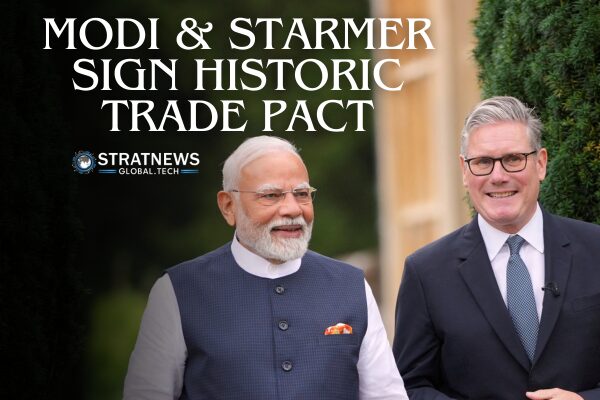India and the United Kingdom have signed a long-anticipated free trade agreement (FTA), marking a new chapter in economic cooperation between the two major economies. The deal, signed during Prime Minister Narendra Modi’s official visit to the UK, will significantly reduce tariffs on goods including Scotch whisky, Indian textiles, and passenger vehicles.
The accord comes after years of on-and-off negotiations and is the UK’s most substantial trade deal since its departure from the European Union in 2020. For India, it marks its most comprehensive agreement with a developed economy and may serve as a blueprint for future deals with the EU and other regions.
Billions in Trade, Lower Duties
The FTA is projected to increase bilateral trade by £25.5 billion by 2040. Key beneficiaries will include companies like Diageo, BMW, and Jaguar Land Rover, which will now face significantly lower duties when exporting to India. Indian goods such as jewellery, seafood, and garments will enjoy broader market access in Britain.
Under the deal:
Tariffs on Scotch whisky will be halved to 75% immediately and gradually lowered to 40% over the next decade.
Tariffs on cars exported to India will fall to 10% within five years, down from as much as 110%.
99% of Indian exports to the UK will now be duty-free.
British tariffs on Indian imports will also reduce sharply, lowering the average rate from 15% to 3%.
However, while symbolically significant, the economic boost to the UK—an estimated £4.8 billion annually—is modest compared to its £2.6 trillion GDP.
Strategic and Symbolic Gains
The trade pact goes beyond goods. It includes cooperation on climate change, defence, crime prevention, and services such as insurance. There are also measures to ease temporary business travel and avoid double social security contributions for posted workers. However, visa arrangements remain unchanged.
Speaking from Chequers, British Prime Minister Keir Starmer described the deal as ushering in a “new global era for trade,” while Modi called it “a blueprint for our shared prosperity.”
Commerce Minister Piyush Goyal credited the success of the talks to mutual respect for each nation’s sensitivities. The agreement was concluded just months after Labour returned to power and relaunched trade talks in February.
Whisky, Cars and Climate Considerations
Despite the sweeping tariff cuts, India did not secure exemptions from Britain’s forthcoming Carbon Border Adjustment Mechanism, which could impose green tariffs from 2027. A separate investment treaty remains under discussion.
Still, the trade deal is seen as a critical stepping stone for India’s ambitions to negotiate deeper economic ties with the EU and the US.
“It shows how serious India is about engaging with the developed world,” said Goyal.
(with inputs from Reuters)


